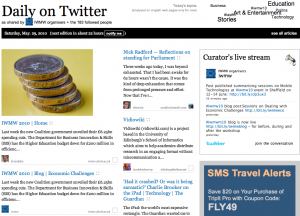IWMW have been lucky enough to be able to offer a number of sponsored places for those who haven’t been able to secure institutional support for this year’s event. As we are all aware these are difficult economic times and the Higher Education sector is having to make significant cuts. The staff development fund is unfortunately one of the easier targets.
Ranjit Sidhu, founder of Statistics into Decisions (or SiD) who have sponsored the places explains the reasons behind this different approach to financial support:
“I first attended IWMW back in 2005 and then 2006, what I learn’t in those two events, from the talks and people, gave me an insight that was unique and could not be replicated by courses or books. I am hugely indebted to the IWMW for my own personal professional development and that is why I feel privileged that Statistics into Decisions is able to sponsor people to attend IWMW 2010“.
Those who have been awarded the sponsered places will be ‘helping out’ with some of back room work that goes on at IWMW such as blogging, videoing and interviewing delegates and writing up reviews of sessions. You will posibly see them out-and-about doing their stuff so we’d like to give them an opportunity to introduce themselves, say why they applied and what they hope to get out of the event.
Amy Chamier, Web Editor, Marketing & Development Unit, University of London
A small, specialist HE institution like mine can’t afford a large web team – there are only two of us. And so we rely heavily on the annual IWNW to keep in touch with the latest thinking and technology, and to learn from the experiences of more sophisticated members of the HE community. My particular contributions will be asking stupid questions (not too many I hope, but enough to give other delegates confidence to ask questions) and introducing people to other people (I like to talk to everyone and then make introductions where delegates have interests in common). I hope to run a Barcamp this year called “Distributed publishing? You can’t be serious”.
Keith Doyle, Extreme Usability
I’m looking forward to returning to the Institutional Web Management Workshop. Last time I attended was in York 2007, when I was Web Content Architect at the University of Salford. This time, I am about to set up a business called ‘Extreme Usability’. I am turning up to facilitate a workshop on Developing Your Personal Contingency Plan for people who are thinking of changing jobs or setting up their own business, having done both since working at Salford. Thanks to the sponsored place, I can attend the whole workshop, be an extra pair of hands for the organisers, and talk user experience with unsuspecting delegates!
Lynda Bewley, Web Content Editor, Birkbeck, University of London
My attendance will:
- Ensure that the current projects that I am working on benefit from an understanding of the latest challenges and trends in university web development
-
Allow me to learn from the experiences of web teams who have worked on similar projects, and bring knowledge and cost-saving ideas back to Birkbeck
-
Allow Birkbeck to manage as many elements as possible of these projects in-house, therefore saving on external consultancy costs
-
Ensure that the communications team are up-to-date with technical trends and challenges in the sector
-
Help my team to be able highlight/justify the importance of continuing to invest in our web presence during challenging times (the theme of the conference)
I hope to contribute:
- The perspective of a content editor
-
Experience of leading re-launch projects at HE institutions
-
Experience of developing a social media strategy and managing social media presences on an ongoing basis
-
An awareness of the challenges of devolved editorial management
Owen Stephens, consultant and OU
I am very pleased and excited to running a workshop at IWMW2010 (FlashMash – Parallel Session A7). My current position as both a consultant, and a part-time employee of the largest University in the UK (the Open University) gives me an unusual perspective on the challenges facing those working in the HE sector, and I believe I have valuable insights I can share with other delegates through contribution to formal sessions and more informal networking throughout the conference.
I’m also keen to actively participate in the ‘amplified event’. My blogging for IWMW2010 would form both part of the amplified event and the record of the event which will continue to be a useful resource in the future.
In a previous role (2005-2007) I was responsible for web based services for a small university (Royal Holloway, University of London), including the institutional web site, the student portal, the VLE and a range of library systems. I am eager to hear from current practitioners what has changed since then, and also to see how the continued growth of the web has affected the way specialised services (such as the library and VLE) fit into the overall institutional web presence.
My experience at IWMW2010 is something I will share with colleagues at the Open University, both via my blog, and through local dissemination events.
Billy Fallows, Web Editor, College of Arts and Law, Birmingham
I attended last year’s IWMW in Colchester but was not able to attend this year’s event. I’d love to put my experience to use producing a series of video interviews with participants for your blog at this year’s event!


